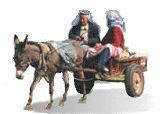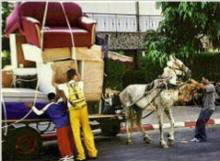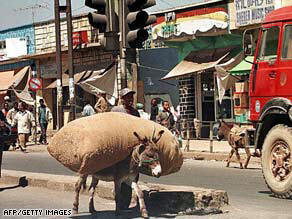Concern for Helping Animals in Israel CHAI http://chaiisrael.org/en/compassion/work_overview.htm
Work Animals (overview)
 From
the moment humans domesticated animals, we sought ways to put them to work for
our benefit. Some animals, like dogs, cooperated in exchange for a regular food
source. Most animals were captured from the wild and forced to perform tasks for
us. Animals have been used in our wars, to plow the land and gather our food, to
transport us, carry our messages, haul our heavy loads, guard our possessions,
including herds of other animals, guide and serve our handicapped, test our
drugs and weapons on their own bodies, and entertain us. Modern technology
provides substitutes for most of these uses.
From
the moment humans domesticated animals, we sought ways to put them to work for
our benefit. Some animals, like dogs, cooperated in exchange for a regular food
source. Most animals were captured from the wild and forced to perform tasks for
us. Animals have been used in our wars, to plow the land and gather our food, to
transport us, carry our messages, haul our heavy loads, guard our possessions,
including herds of other animals, guide and serve our handicapped, test our
drugs and weapons on their own bodies, and entertain us. Modern technology
provides substitutes for most of these uses.
In return for their labor, loyalty, and the sacrifice of their lives, we abuse, betray, and abandon them. Increased awareness that non-human animals have consciousness and feelings requires that we ask ourselves whether it is morally acceptable to use animals as disposable objects, put on earth merely to serve humans, without desires, needs, and an independent destiny of their own.
The false barriers we erected to separate ourselves from animals are falling, one by one. The maternal feelings of animal mothers for their offspring and their willingness to endanger their own lives for their young have been shown to equal that of human mothers. We have learned that animals have language, make and use tools, reason, plan, take care of their sick and old, appreciate beauty, and grieve for their dead.
Imagine yourself in the place of animals forced into service, and consider whether we have the right to go on using them as though they were inanimate objects, put on earth purely to serve us in whatever way we deem fit. Isn't it time for a radical change for the better in our relationship with animals?
Cart Horses and Donkeys: Abuse and Rescue (overview)
 In
Israel, as throughout the Middle East, horses and donkeys are the victims of
abuse. People use them to carry heavy loads, like furniture, watermelons and
other fruits and vegetables in summer, and rocks from construction sites. In
most parts of the country, no legislation exists to require licensing and
inspections. Even in those cities where it does exist, the legislation is not
enforced, so most of these animals are not licensed, inspected, or provided with
veterinary care. Often, they are fed only the damaged produce or nutritionally
inadequate forage containing burrs that cause sores in their mouths. At the end
of the summer season, or when lameness prevents them from being useful, they are
abandoned.
In
Israel, as throughout the Middle East, horses and donkeys are the victims of
abuse. People use them to carry heavy loads, like furniture, watermelons and
other fruits and vegetables in summer, and rocks from construction sites. In
most parts of the country, no legislation exists to require licensing and
inspections. Even in those cities where it does exist, the legislation is not
enforced, so most of these animals are not licensed, inspected, or provided with
veterinary care. Often, they are fed only the damaged produce or nutritionally
inadequate forage containing burrs that cause sores in their mouths. At the end
of the summer season, or when lameness prevents them from being useful, they are
abandoned.
Tiny donkeys also are made to pull loads far too heavy for them, and they are beaten frequently. Their hooves are often left untrimmed for so long that it becomes difficult and painful for them to walk. And, for some reason that we don't yet understand (possibly malnutrition and overloading at an early age), donkeys are sometimes found abandoned on the road with broken legs. CHAI provided an Israeli animal activist with video camera equipment in order to obtain video footage of abused horses and donkeys. This photograph shows an abused donkey whose ears were cut off. Kolbotek, a widely watched exposé program, aired the footage, and the program's host called for the intervention of government authorities to prevent and stop the abuse.
Municipal veterinarians say they do not remove equine victims from their abusers because they have no place to take them. CHAI and Hakol Chai have rescued several horses, and we are planning to establish a Horse and Donkey Sanctuary.
Clinic treats abused donkeys, the Ethiopian 'family car'
August 29, 2007
BISHOFTU, Ethiopia (Reuters) -- Ethiopian farmer Fekadu Asfaw stood defiantly
before an angry veterinarian, having just beaten his four severely malnourished
donkeys.

Many Ethiopians are subsistence farmers who depend on
donkeys for travel and to take their crops to market.
"They are donkeys, aren't they? They have to be beaten to perform commands,"
Fekadu said.
Visibly furious, veterinarian Fissiha Gebre-ab turned to other farmers and their
beasts of burden nearby with a harsh admonition: "Don't you know the saying that
a farmer without a donkey is a donkey, because he has to carry the burden
himself?"
He continued: "You should treat them humanely.
Do not
beat them and overburden
them. You should also feed them properly if they have to serve you for a long
time."
In a region where donkeys are essential to farmers' livelihoods -- richer
countries might compare them in worth and durability to the family car -- his
words carry much weight.
Fissiha treats plenty of donkeys in bedraggled and pitiable condition at his
clinic 50 kilometers (30 miles) east of Addis Ababa, in what the founders say is
one of only two in Africa -- a center for improving the health and welfare of
donkeys.
Hundreds of donkeys suffering from open back sores, broken hooves, malnutrition
and disease come every week through the clinic, which has operating theaters,
recovery rooms and a laboratory.
Located inside the University of Addis Ababa's veterinary school in Bishoftu,
the
Donkey Health and Welfare Project treats the animals for free and gives the
farmers who bring them stern advice on how they should care for the beasts. "Ethiopian donkeys have been abused for centuries due to ignorance, despite
their valuable services in time of peace and war," Fissiha told Reuters.
As a result, Ethiopia's donkeys live an average of 9 years, while donkeys in
Kenya and Mexico live an average of 14 years, according to the Web site of the
U.K.-based Donkey Sanctuary charity, which founded the Ethiopian clinic in 1999.
By comparison, Fissiha said British donkeys -- which typically do not face hard
farm labor -- live well over 30 years.
Donkeys play critical role for Ethiopian farmers
The clinic, supplemented by two mobile clinics, teaches farmers how to shoe the
donkeys and also trains veterinarians on proper treatment so they can practice
it countrywide.
Since many Ethiopians live at a subsistence farming level, the donkey is a
critical part of their life and their main mode of transporting crops to market.
"The death of a donkey for the family is equivalent to the replacement of the
family car," the Donkey Sanctuary's Web site says of Ethiopian donkeys.
In the capital's grain market, some 3,000 donkeys visit daily. Encountering a
caravan of donkeys carrying goods across Addis Ababa -- and blocking traffic in
the city of 5 million -- happens daily.
The Society for Protection of Animals Abroad, another British charity, also
funds a separate clinic for horses and mules which operates alongside the donkey
facility.
Horses, donkeys and mules, which are the best choice for farming in the
country's mountainous and rugged terrain, have all played critical roles in
Ethiopia's military history.
Emperor Menelik II used them all to transport provisions and military equipment
during his 1884 Battle of Adwa to defeat Italy's better-equipped army.
And the Ethiopian People's Revolutionary Democratic Front -- now the ruling
party -- used them to move its military hardware through northern Ethiopia's
mountains against the highly mechanised army of Marxist ruler Mengistu Haile
Mariam until they overthrew him in 1991.
Animal welfare on the agenda for developing countries
November 17, 2008 WSPA
Last week the G77 – a loose coalition of 130 developing countries represented at the United Nations – hosted their first ever ambassador-level briefing on animal welfare issues and how they impact on human livelihoods. WSPA provided the briefing. “The relevance of animal welfare to the G77 is clear: of the one billion poorest people in the world, over 750 million depend totally on animals for a living. Most of those poor live in G77 countries,” said Major General Peter Davies, Director General of WSPA.
This was the highest-level presentation about animal welfare ever received at UN headquarters in New York, showing that compassionate treatment of animals is now gaining widespread, serious consideration.
WSPA worked with a representative from the Brazilian Ministry of Agriculture to highlight how animal welfare is an essential component of the UN’s own development goals, including their environmental and humanitarian agenda.
Animal welfare: no Western luxury
Animal welfare, for their own sake, has many valuable knock-on effects for developing nations.
H.E. Mario H. Castellón, representing Nicaragua, spoke about the great dependency on animals in developing countries with large rural populations. He said: “People need animals for working in agriculture, as means of transport or food. Having healthy animals will help the rural development, which will also have implications in urban areas.” This was echoed by Dr Andrea Parrilla, Head of the Animal Welfare Commission of the Ministry of Agriculture, Livestock and Supply of Brazil. She highlighted that simple, cheap changes to farming systems would result in both better welfare conditions for the animals and increased productivity, benefiting local people and the economy.
Animal Ethics: Animals Used as Workers
The Fragile Environment of Developing Countries cannot support TWO populations -- Humans and their Food Animals.
------------------------------------
July 2019 Tourists Beware: Animals Beaten, Abused, at One of Seven Wonders of the World Take action!
It’s common sense that animals have emotions. It’s all about money, greed, uncaringness & self-interest that we exploit all species and the whole planet for humans only.